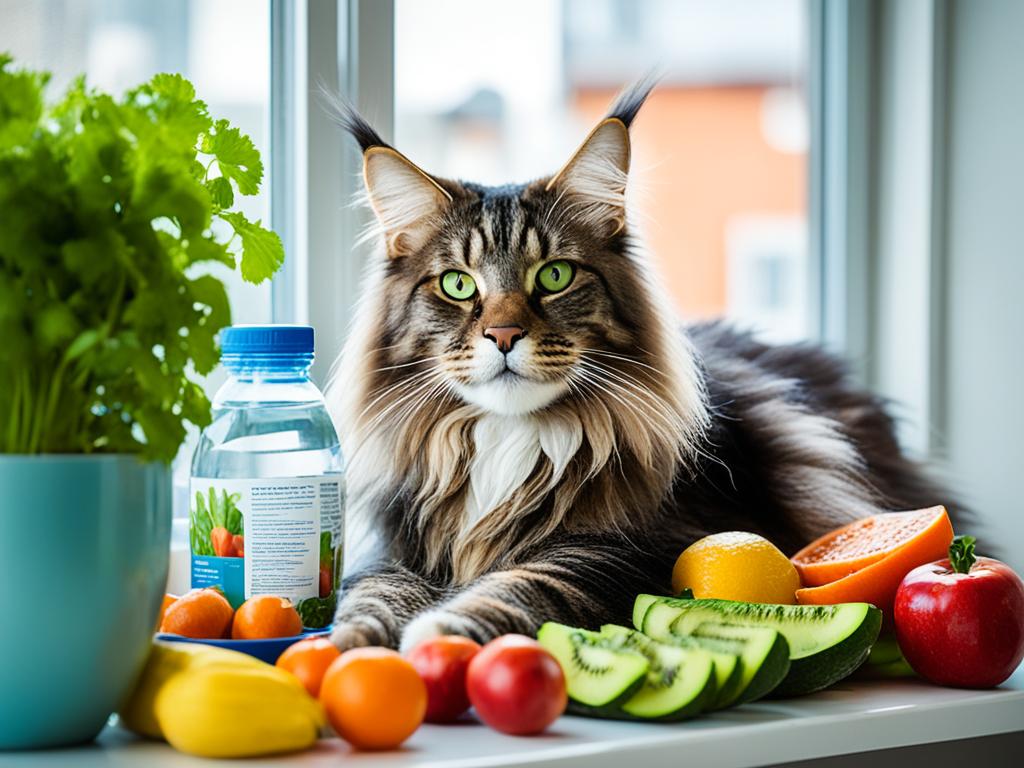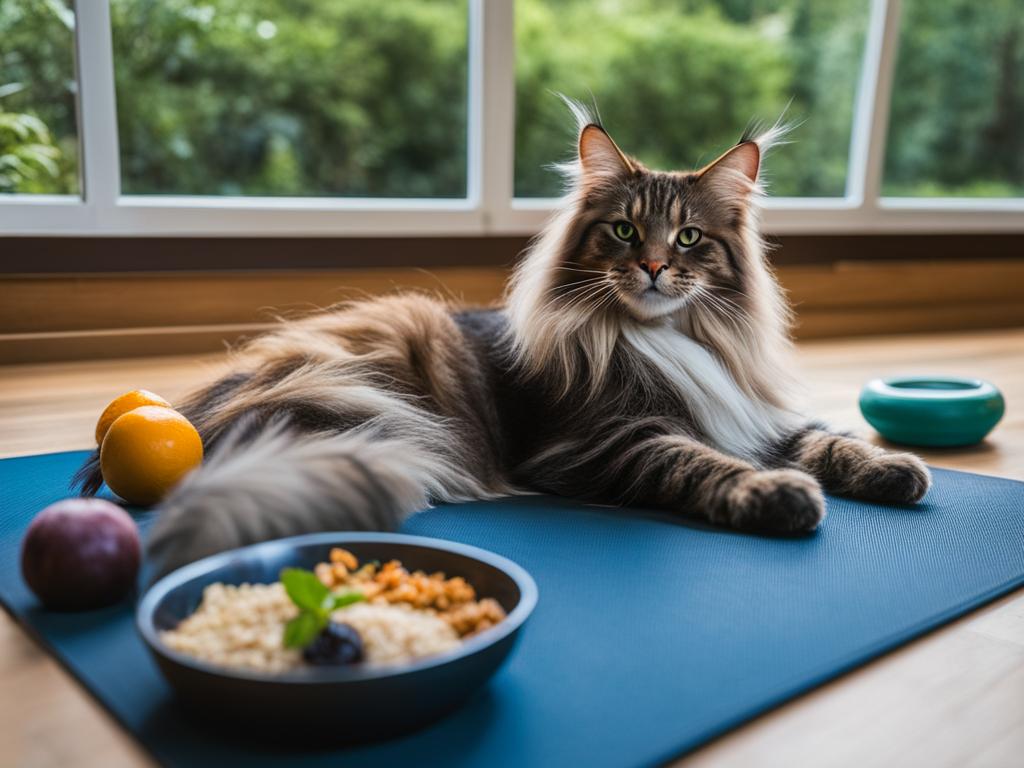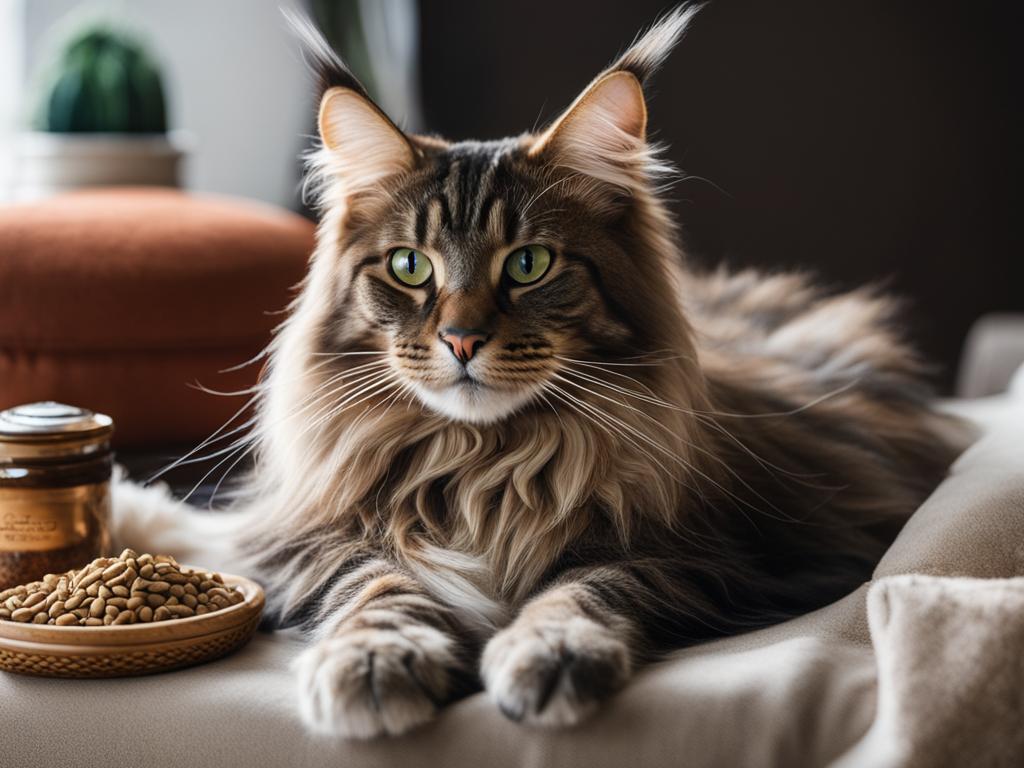Maine Coon cats are beloved for their gentle temperament and unique characteristics. However, they are also prone to certain health issues that can affect their overall well-being. To ensure the best care for your Maine Coon cat, it is essential to understand these health concerns, genetic predispositions, and preventive measures. This article will explore common health problems in Maine Coons, genetic health issues specific to the breed, preventive care guidelines, and tips for maintaining their overall health.
Key Takeaways:
- Maine Coon cats are prone to certain health issues that require special attention.
- Understanding the common health problems in Maine Coons can help you identify early signs and seek veterinary care.
- Genetic health issues such as spinal muscular atrophy (SMA) and polycystic kidney disease (PKD) are prevalent in Maine Coons.
- Preventive measures such as regular check-ups, vaccinations, and parasite control are essential for maintaining their health.
- A balanced diet, exercise, grooming, and hygiene practices contribute to the overall well-being of Maine Coons.
Common Health Issues in Maine Coons
Maine Coon cats, like any other breed, are prone to certain health issues that can affect their overall well-being. By being aware of these common health problems, you can take proactive measures to manage these conditions effectively. Here are some of the most prevalent health issues that Maine Coons may encounter:
Hip Dysplasia
Hip dysplasia is a genetic condition that affects the hip joints of Maine Coon cats. It can cause pain, discomfort, and lead to arthritis over time. Regular veterinary check-ups and monitoring your cat’s mobility can help detect this condition early and provide appropriate treatment.
Hypertrophic Cardiomyopathy (HCM)
Hypertrophic cardiomyopathy is a common heart disease in Maine Coons, which can cause heart failure if left untreated. Symptoms may include difficulty breathing, lethargy, and irregular heartbeats. Regular cardiac screenings are essential to identify any signs of HCM and ensure proper management.
Dental Disease
Maine Coons are prone to developing dental problems like gingivitis, periodontal disease, and tooth decay. Regular brushing of their teeth, feeding dental-friendly diets, and providing dental treats can help maintain good oral hygiene and reduce the risk of dental diseases.
Obesity
Maine Coons have a tendency to gain weight easily, which can lead to obesity-related health issues such as diabetes, joint problems, and heart disease. Monitoring their diet, providing them with a balanced and appropriate portion size, and encouraging regular exercise can help keep them at a healthy weight.
Vaccine-Preventable Infections
Maine Coons are susceptible to vaccine-preventable diseases like panleukopenia and rabies. Keeping their vaccinations up to date and following veterinary recommendations can protect them from these potentially life-threatening infections.
Understanding and being aware of these common health issues enable you to proactively manage your Maine Coon’s health. Regular veterinary check-ups, proper dental care, weight management, and vaccination adherence can greatly contribute to their overall well-being and longevity.
Genetic Health Issues in Maine Coons
Maine Coon cats, like any other breed, can be genetically prone to certain health conditions. It is important to be aware of these genetic health issues to ensure the well-being of your beloved feline companion. Regular health screening and genetic testing can help identify these conditions early and implement appropriate management strategies.
Spinal Muscular Atrophy (SMA)
One genetic health issue that Maine Coons may be susceptible to is Spinal Muscular Atrophy (SMA). SMA is a condition that affects the nerves and can lead to muscle weakness and paralysis in cats. Early detection through genetic testing can enable proactive measures to manage the progression of the disease and provide the best possible care for affected Maine Coons.
Polycystic Kidney Disease (PKD)
Another genetic disease found in Maine Coons is Polycystic Kidney Disease (PKD). PKD leads to the formation of cysts in the kidneys, which can gradually impair their function and ultimately result in kidney failure. Regular health screenings and genetic testing are essential tools for identifying PKD in Maine Coons and implementing appropriate management plans to maintain their kidney health.
Hypertrophic Cardiomyopathy (HCM)
As mentioned earlier, Hypertrophic Cardiomyopathy (HCM) is a common genetic health issue in Maine Coons. HCM is a heart disease characterized by the thickening of the heart muscles, leading to an increased risk of heart failure. Regular health screenings, including cardiac ultrasounds, can help detect HCM early and allow for timely interventions and treatments to manage the condition.
By staying informed about these genetic health issues and proactively monitoring your Maine Coon’s health through health screenings and genetic tests, you can provide the necessary care and support to keep them happy and healthy.

Preventive Measures for Maine Coon Health
Prevention is key when it comes to maintaining the health of your beloved Maine Coon. By implementing these preventive measures, you can ensure that your furry friend stays happy and healthy for years to come.
Regular Veterinary Check-ups
Regular visits to the veterinarian are essential for early detection and treatment of any potential health issues your Maine Coon may have. Through comprehensive physical examinations and health screenings, your veterinarian can identify and address any concerns before they become major problems. This proactive approach allows for prompt intervention and improved outcomes.
Vaccinations
Ensuring that your Maine Coon is up to date on their vaccinations is crucial for protecting them against common diseases. Vaccines such as panleukopenia and rabies are particularly important as they offer preventive care from potentially life-threatening illnesses. Be sure to follow your veterinarian’s recommended vaccination schedule to keep your Maine Coon protected.
Maintaining a Healthy Weight
Proper nutrition and exercise play a significant role in maintaining your Maine Coon’s weight and overall health. Obesity can lead to a range of health problems, including diabetes, joint issues, and heart disease. Provide a balanced diet that meets their nutritional needs and ensure they engage in regular exercise to keep them fit and healthy.
Parasite Control
Parasites such as fleas and ticks can carry diseases and cause discomfort for your Maine Coon. Implementing flea and tick prevention measures, such as topical treatments or collars, can help protect your cat from these pests. Regular grooming and thorough checks for any signs of infestation are also essential for maintaining their well-being.
Environmental Enrichment
Maintaining your Maine Coon’s mental and physical well-being involves providing them with a stimulating environment. Offer interactive toys, scratching posts, and climbing structures to keep them mentally engaged and physically active. This enrichment not only prevents boredom but also promotes a healthier and happier Maine Coon.

| Preventive Measures | Benefits |
|---|---|
| Regular Veterinary Check-ups | Early detection and intervention for potential health issues |
| Vaccinations | Protection against common diseases |
| Maintaining a Healthy Weight | Prevention of obesity-related health problems |
| Parasite Control | Prevention of flea and tick infestations |
| Environmental Enrichment | Mental stimulation and physical activity |
Nutrition and Exercise for Maintaining Maine Coon Health
Proper nutrition and exercise are crucial for maintaining the overall health and well-being of your Maine Coon. By following a balanced diet and providing ample opportunities for physical activity, you can help your furry companion stay in optimal condition.
Nutrition Tips:
- Choose a high-quality cat food that is specifically formulated for Maine Coons. Look for options that are rich in protein and low in carbohydrates to support their muscle mass and prevent weight gain.
- Consult with your veterinarian to determine the appropriate portion size for your Maine Coon based on their age, weight, and activity level. Avoid overfeeding, as obesity can lead to various health issues.
- Consider incorporating wet food into their diet to ensure proper hydration and to provide additional nutrients.
Exercise Recommendations:
- Engage in interactive play sessions with toys that encourage your Maine Coon to chase, pounce, and jump. This will not only provide physical exercise but also mental stimulation.
- Set up climbing structures and scratching posts to satisfy their natural instincts for climbing and scratching. This will help keep their muscles toned and prevent boredom.
- Provide opportunities for outdoor exploration, such as supervised access to an enclosed garden or patio, to allow your Maine Coon to exercise and engage with their environment.
Regular monitoring of your Maine Coon’s weight and adjustment of their diet and exercise routine as needed are important for preventing obesity-related health issues. Additionally, consult with your veterinarian for personalized advice on nutrition and exercise based on your cat’s specific needs.
Image:

Grooming and Hygiene for Maine Coons
Maine Coons, with their long and thick fur, require regular grooming to maintain their health and appearance. By following a few grooming and hygiene practices, you can ensure that your Maine Coon stays clean, comfortable, and free from common issues such as matting and excessive shedding.
Brushing Their Fur
One of the essential grooming tasks for Maine Coons is regular brushing. Brush their fur several times a week using a metal comb or slicker brush. This helps remove loose hair, prevent tangles, and reduce the risk of hairballs.
Ear Cleaning and Nail Trimming
In addition to brushing, it’s important to pay attention to your Maine Coon’s ears and nails. Clean their ears regularly using a vet-approved ear cleaner and cotton pads or balls. This helps prevent wax buildup and reduces the risk of ear infections.
Trimming your cat’s nails is vital to prevent them from growing too long and causing discomfort or injury. Use a cat-specific nail trimmer and follow grooming guidelines to ensure a safe and stress-free experience for both you and your Maine Coon.
Teeth Brushing
Maintaining good oral hygiene is crucial for your Maine Coon’s overall health. Regularly brush their teeth using a cat-friendly toothbrush and toothpaste. This helps prevent dental issues such as tartar buildup, gum disease, and bad breath. Start brushing their teeth gradually, using positive reinforcement, and consult your veterinarian for guidance.
Promoting Overall Hygiene
Aside from grooming tasks, there are a few other measures you can take to promote the overall hygiene of your Maine Coon. Provide fresh water daily and ensure the litter box is clean at all times. These simple steps help keep your cat hydrated and reduce the risk of urinary tract infections.
Feeding your Maine Coon a balanced diet that meets their nutritional needs is also essential for their overall hygiene and well-being. Consult your veterinarian to determine the appropriate diet for your cat’s age, weight, and health condition.
Conclusion: Ensuring the Well-Being of Your Maine Coon
By understanding the common health issues and genetic predispositions in Maine Coon cats, implementing preventive measures, and providing proper care, you can ensure the well-being of your beloved feline companion. Regular veterinary check-ups, vaccinations, and health screenings are crucial for early detection and management of any health issues.
Maintaining a healthy weight, providing a balanced diet, and encouraging regular exercise can prevent obesity-related problems. Proper grooming and hygiene practices can contribute to their overall health and happiness. By following these guidelines, you can enjoy a long and fulfilling life with your Maine Coon cat.
Remember, health screening for Maine Coon cats is essential to identify any genetic health issues early on. This can help you and your veterinarian develop a comprehensive care plan to manage and minimize the impact of these conditions. Additionally, tips for maintaining Maine Coon health include regular veterinary visits, proper nutrition, exercise, and grooming. By prioritizing your Maine Coon’s health care, you can provide them with a happy and healthy life.
FAQ
What are the common health issues in Maine Coons?
Common health issues in Maine Coons include hip dysplasia, hypertrophic cardiomyopathy (HCM), dental disease, obesity, and vaccine-preventable infections such as panleukopenia and rabies.
What genetic health issues are specific to Maine Coon cats?
Maine Coon cats can be genetically predisposed to conditions such as spinal muscular atrophy (SMA), polycystic kidney disease (PKD), and hypertrophic cardiomyopathy (HCM).
How can I prevent health issues in my Maine Coon?
Preventive measures include regular veterinary check-ups, vaccinations, health screenings, maintaining a healthy weight, providing proper nutrition and exercise, and parasite control.
What nutrition and exercise guidelines should I follow for my Maine Coon?
It is important to feed your Maine Coon a balanced diet that is high in protein and low in carbohydrates, monitor their weight, and provide regular exercise and mental stimulation.
How should I groom and maintain the hygiene of my Maine Coon?
Regular grooming, including brushing their fur, cleaning their ears, trimming their nails, and brushing their teeth, is important for maintaining their hygiene and preventing dental issues.
How can I ensure the well-being of my Maine Coon?
Ensuring the well-being of your Maine Coon involves regular veterinary check-ups, preventive care measures, proper nutrition and exercise, and maintaining their grooming and hygiene practices.

Leave a Reply